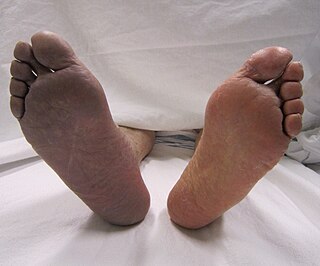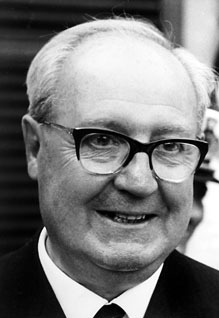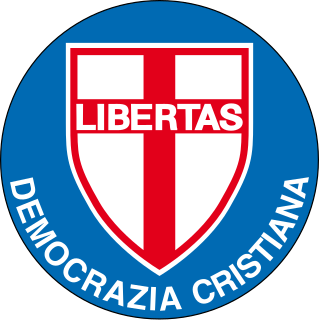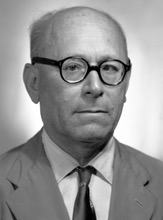
The Italian Socialist Party was a socialist and later social-democratic political party in Italy. Founded in Genoa in 1892, the PSI dominated the Italian left until after World War II, when it was eclipsed in status by the Italian Communist Party. The Socialists came to special prominence in the 1980s, when their leader Bettino Craxi, who had severed the residual ties with the Soviet Union and re-branded the party as liberal-socialist, served as Prime Minister (1983–1987). The PSI was disbanded in 1994 as a result of the Tangentopoli scandals. Prior to World War I, future dictator Benito Mussolini was a member of the PSI.

Pietro Sandro Nenni was an Italian socialist politician, the national secretary of the Italian Socialist Party (PSI) and lifetime Senator since 1970. He was a recipient of the Stalin Peace Prize in 1951. He was a central figure of the Italian left from the 1920s to the 1960s.

The indirect election of the President of the Italian Republic was held on May 8–10, 2006. As a second-level, indirect election, only Members of Parliament and regional deputies were entitled to vote. Giorgio Napolitano was elected head of state of the Italian Republic, a role of representation of national unity and guarantee that Italian politics comply with the Constitution, in the framework of a parliamentary system.

A French legislative election took place on 25 May and 1 June 1997 to elect the 11th National Assembly of the French Fifth Republic. It was the consequence of President Jacques Chirac's decision to call the legislative election one year before the deadline.

General elections were held in Italy on 28 April 1963, to select the Fourth Republican Parliament. It was the first election with a fixed number of MPs to be elected, as decided by the second Constitutional Reform in February 1963. It was also the first election which saw the Secretary of Christian Democracy to refuse the office of Prime Minister after the vote, at least for six months, preferring to provisionally maintain his more influent post at the head of the party: this fact confirmed the transformation of Italian political system into a particracy, the secretaries of the parties having become more powerful than the Parliament and the Government.

General elections were held in Italy on 19 May 1968 to select the Fifth Republican Parliament. Democrazia Cristiana (DC) remained stable around 38% of the votes. They were marked by a victory of the Communist Party (PCI) passing from 25% of 1963 to c. 30% at the Senate, where it presented jointly with the new Italian Socialist Party of Proletarian Unity (PSIUP), which included members of Socialist Party (PSI) which disagreed the latter's alliance with DC. PSIUP gained c. 4.5% at the Chamber. The Socialist Party and the Democratic Socialist Party (PSDI) presented together as the Unified PSI–PSDI, but gained c. 15%, far less than the sum of what the two parties had obtained separately in 1963.

General elections were held in Italy on 7 May 1972, to select the Sixth Republican Parliament. Democrazia Cristiana (DC) remained stable with around 38% of the votes, as did the Communist Party (PCI) which obtained the same 27% it had in 1968. The Socialist Party (PSI) continued in its decline, reducing to less than 10%. The most important growth was that of the post-fascist Italian Social Movement, who nearly doubled its votes from 4.5% to about 9%, after its leader Giorgio Almirante launched the formula of the National Right, proposing his party as the sole group of the Italian right wing. After a dismaying result of less than 2%, against the 4.5% of 1968, the Italian Socialist Party of Proletarian Unity was disbanded; a majority of its members joined the PCI.

The Italian Socialist Party is a social-democratic political party in Italy.
Pier Luigi Romita was an Italian politician who was several time minister of the Italian Republic.
The Social Democrats, whose complete name is The Social Democrats – Federalists for the Euromediterranean, is a minor social-democratic political party in Italy. Mimmo Magistro is the party leader.
The Italian Democratic Socialist Party is a political party in Italy founded in 2004 as the continuation of the historical PSDI of Giuseppe Saragat, so that the new PSDI numbers its congresses in perfect continuity with the old PSDI. The party retains some support locally in the South, especially in Apulia. In the 2005 Apulian regional election the party won 2.2% of the vote along with other two minor parties and got one deputy elected to the Regional Council. The party did not repeat itself five years later, when it was not even able to file a list.

The Italian presidential election of 1978 was held in Italy on 29 June – 8 July 1978, following the resignation of incumbent President Giovanni Leone on 15 June 1978, because of the Lockheed bribery scandals. Only members of Parliament and regional delegates are entitled to vote. As head of state of the Italian Republic, the President has a role of representation of national unity and guarantees that Italian politics comply with the Italian Constitution, in the framework of a parliamentary system.

The Italian presidential election of 1971 was held in Italy on 9 – 24 December 1971. Only members of Parliament and regional delegates are entitled to vote. As head of state of the Italian Republic, the President has a role of representation of national unity and guarantees that Italian politics comply with the Italian Constitution, in the framework of a parliamentary system.

The Italian presidential election of 1962 was held in Italy on 2 – 6 May 1962. Only members of Parliament are entitled to vote. As head of state of the Italian Republic, the President has a role of representation of national unity and guarantees that Italian politics comply with the Italian Constitution, in the framework of a parliamentary system.
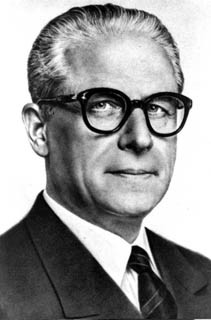
The Italian presidential election of 1955 was held in Italy on 28 – 29 April 1955. Only members of Parliament are entitled to vote. As head of state of the Italian Republic, the President has a role of representation of national unity and guarantees that Italian politics comply with the Italian Constitution, in the framework of a parliamentary system.

The Italian presidential election of 1948 was held in Italy on 10 – 11 May 1948, following the resignation of outgoing President Enrico De Nicola. Only members of Parliament are entitled to vote and this election was the first one voted by a regular Parliament. As head of state of the Italian Republic, the President has a role of representation of national unity and guarantees that Italian politics comply with the Italian Constitution, in the framework of a parliamentary system.


